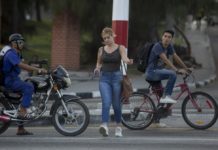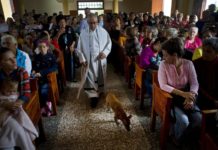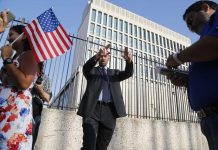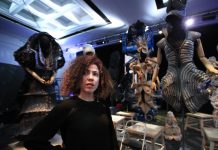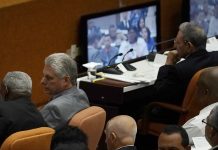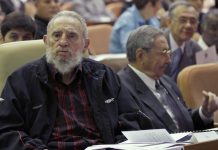HAVANA (AP) — A protester briefly disrupted the start of Cuba’s largest annual political event on Monday, sprinting in front of May Day marchers and brandishing a U.S. flag before he was dragged away.
President Raul Castro watched along with other military and civilian leaders and foreign dignitaries as the man broke through security and ran ahead of the tens of thousands in the pro-government march.
Wearing a Cuban flag T-shirt and gripping the Stars and Stripes above his head, he stayed ahead of two similarly dressed security agents until he was swarmed by other officials and tripped over his own feet.
Plainclothes officers struggled to control the man but eventually lifted him off the ground and hauled him away in front of foreign and Cuban journalists covering the parade. Two of the guards shouted “Long live Raul!” and “Long live Fidel!” — Castro’s older brother and predecessor, who died Nov. 25. One struck the protester in the face as he was carried past reporters.
The protest was a surprising breach of security at a government-organized event where agents line the route of the march. It echoed a September 2015 demonstration that saw a member of the Santiago-based dissident group Patriotic Union of Cuba approach Pope Francis and cry out to the pontiff before security agents detained him. Several others were arrested nearby as they appeared to try to join the protest.
The identity of the protester detained Monday was not clear, and no dissident group immediately claimed him as a member. Cuba’s official media did not report on the incident.
Havana’s May Day march is Cuba’s largest regular gathering, a carefully choreographed display of support for the socialist system by hundreds of thousands of people organized by their state-run workplaces.
Castro has said he will step down as president in February, making this his last May Day parade as head of state, but the Cuban government has said virtually nothing about the succession process.
That political ambiguity, along with an economic slowdown spawned by reduced aid from Venezuela, has created a tense and uncertain atmosphere on the island.
While it has relaxed control of many aspects of everyday life, Cuba’s single-party Communist government maintains practically zero tolerance for political protest, labeling dissidents as paid agents of the U.S. government and Cuban exile groups who want to return capitalism to the island.



